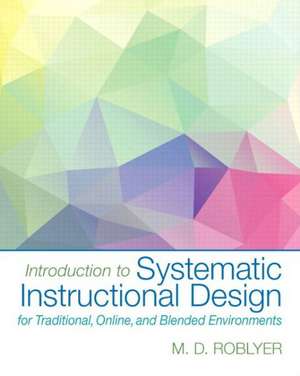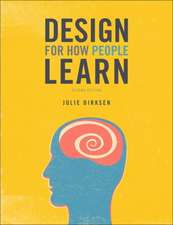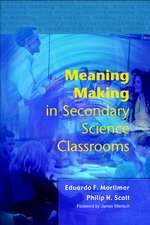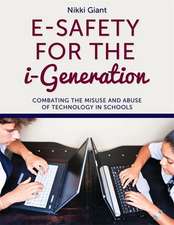Introduction to Systematic Instructional Design for Traditional, Online, and Blended Environments with Access Code
Autor M. D. Roblyeren Limba Engleză Mixed media product – 2 apr 2014
"This package includes the Enhanced Pearson eText and the loose-leaf version" "Introduction to Systematic Instructional Design for Traditional, Online, and Blended Environments "provides an accessible introduction for instructional design novices. The book updates traditional, ADDIE-based approaches (named for the five-step Analysis, Design, Development, Implementation, and Evaluation sequence) to make them relevant for designing today s in-person, multimedia, and distance learning environments. The book s features reflect characteristics that make it uniquely useful among other texts on the topic in that it supports instructional design novices, updates design to address new technologies, illustrates design for online and blended learning environments, and asks that students create their own instructional design projects as they move through the text. The Enhanced Pearson eText features embedded audio, Check Your Understanding exercises, and interactive quizzes. Improve mastery and retention with the Enhanced Pearson eText*
The Enhanced Pearson eText provides a rich, interactive learning environment designed to improve student mastery of content. The Enhanced Pearson eText is:
- Engaging. The new interactive, multimedia learning features were developed by the authors and other subject-matter experts to deepen and enrich the learning experience.
- Convenient. Enjoy instant online access from your computer or download the Pearson eText App to read on or offline on your iPad(r) and Android(r) tablet.*
- Affordable. Experience the advantages of the Enhanced Pearson eText along with all the benefits of print for 40% to 50% less than a print bound book.
- 0130196150 / 9780130196156 Introduction to Systematic Instructional Design for Traditional, Online, and Blended Environments, Loose-Leaf Version
- 0133827682 / 9780133827682 Introduction to Systematic Instructional Design for Traditional, Online, and Blended Environments, Enhanced Pearson eText -- Access Card
Preț: 438.51 lei
Preț vechi: 541.37 lei
-19% Nou
Puncte Express: 658
Preț estimativ în valută:
83.91€ • 87.84$ • 69.43£
83.91€ • 87.84$ • 69.43£
Carte disponibilă
Livrare economică 17-31 martie
Preluare comenzi: 021 569.72.76
Specificații
ISBN-13: 9780133831641
ISBN-10: 0133831647
Pagini: 320
Dimensiuni: 211 x 272 x 13 mm
Greutate: 0.52 kg
Editura: Pearson
ISBN-10: 0133831647
Pagini: 320
Dimensiuni: 211 x 272 x 13 mm
Greutate: 0.52 kg
Editura: Pearson
Textul de pe ultima copertă
An accessible introduction for instructional design novices, this book updates traditional, ADDIE-based approaches (named for the five-step Analysis, Design, Development, Implementation, and Evaluation sequence) to make them relevant for designing today s in-person, multimedia, and distance learning environments. The book s features reflect characteristics that make it uniquely useful among other texts on the topic:
- Supports instructional design novices with features that make the ideas accessible, including:
- Chapter opening scenarios
- Listen to Learn audio overviews of chapter content (available in the Pearson eText)
- Check Your Understanding exercises (available in the Pearson eText)
- Example design projects
- Updates design to address new technologies with design steps, criteria, and resources for the full range of media options, including:
- Design tips for creating and/or using resources such as podcasts/vodcasts, social media, and apps.
- Steps and criteria for producing effective hypermedia, audio/video, and web-based materials.
- Illustrates design for online and blended learning environments to ensure successful learning of the implementation stage of the ADDIE process, including:
- Recommendations for designing learning environments ranging from traditional, in-person classrooms to completely online or virtual courses.
- Design principles and criteria for online and blended strategies ranging from the flipped-classroom model to MOOCs (Massive Open Online Courses).
- Students create their own instructional design projects as they move through the text.








